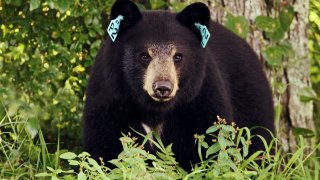
While humans may be staying home, this is the time of year black bears tend to be out and about.
The Department of Energy and Environmental Protection is reminding the public that bear activity increases in the early spring. Connecticut's bear population continues to grow - in 2019, there were sightings reported in 150 of the state's 169 towns.
DEEP reminds residents to take steps to avoid issues with the animals.
DEEP TIPS TO AVOID PROBLEMS WITH BLACK BEARS
- Never feed bears.
- Take down, clean, and put away birdfeeders by late March, or even earlier during mild weather. Store the feeders until late fall. Clean up spilled seed from the ground.
- Store garbage in secure, airtight containers inside a garage or storage area. Adding ammonia to cans and bags will reduce odors that attract bears. Periodically clean garbage cans with ammonia to reduce residual odor. Garbage for pickup should be put outside the morning of collection and not the night before.
- Bears will damage backyard chicken coops and kill chickens. Therefore, make sure coops and pens are sturdy and consider protecting them with electric fencing. Beehives, berry bushes, and other livestock can also be protected from bears with electric fencing.
- Supervise dogs at all times when outside. Keep dogs on a leash when walking and hiking. A roaming dog might be perceived as a threat to a bear or its cubs.
- Do not leave pet food outdoors.
- Keep barbecue grills clean. Store grills inside a garage or shed.
- Avoid placing meat scraps or sweet foods, such as fruit and fruit peels, in compost piles.
Local
“If you genuinely care about bears, you should never feed them – either intentionally or unintentionally,” said Jenny Dickson, DEEP Wildlife Division Director. “Bears become habituated, losing their fear of humans, when attracted to homes by easily-accessible food sources. Such bears spend more time in neighborhoods and near people, increasing public safety concerns, the likelihood of property damage, and the possibility that the bears may be hit and killed by vehicles or meet with some other misfortune.”
If you run into a bear while hiking, yell or make loud noises. Never try to get close to a bear, and if the bear isn't startled off, slowing leave the area and find a different route. If a bear gets close to you, continue to haze it by making loud noises, waving your arms and throwing sticks or rocks. Never run.
Campers should make sure to keep campsites clean and food and garbage out of reach.
DEEP noted that tagged bears are not "problem" bears, but part of research on the state's bear population.
Bears are rarely aggressive toward people, but if that happens residents can report it to the DEEP’s 24-hour dispatch line at 860-424-3333. Routine sightings can be reported to the Wildlife Division at 860-424-3011.
For more information from DEEP, click here.



